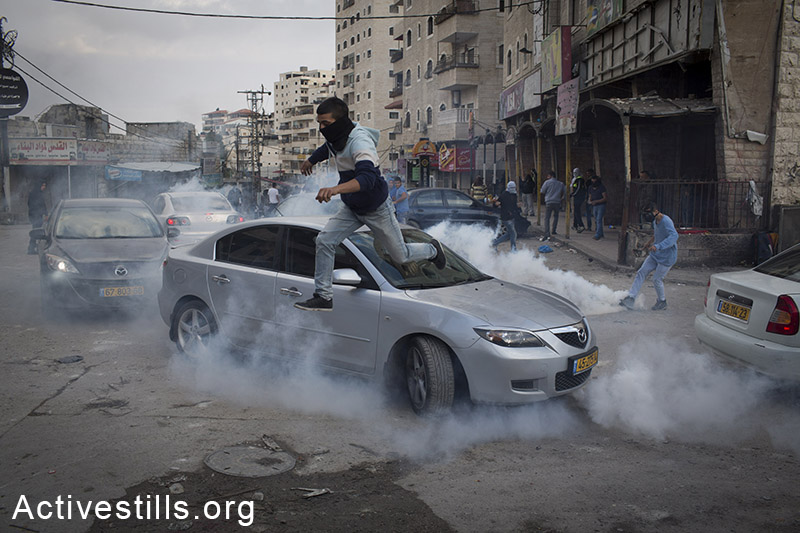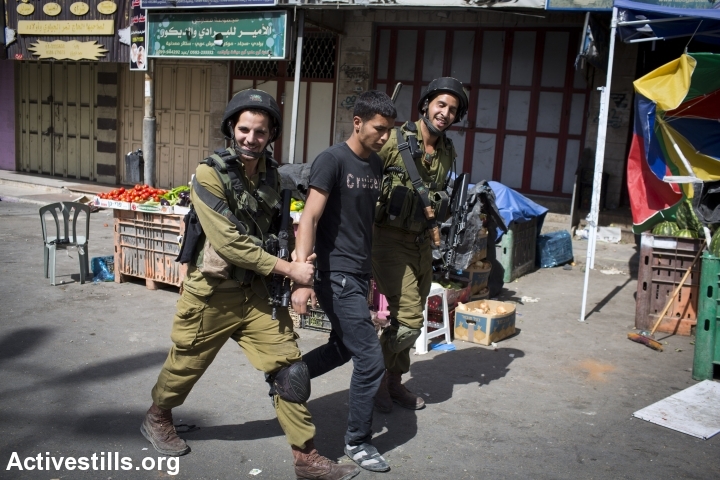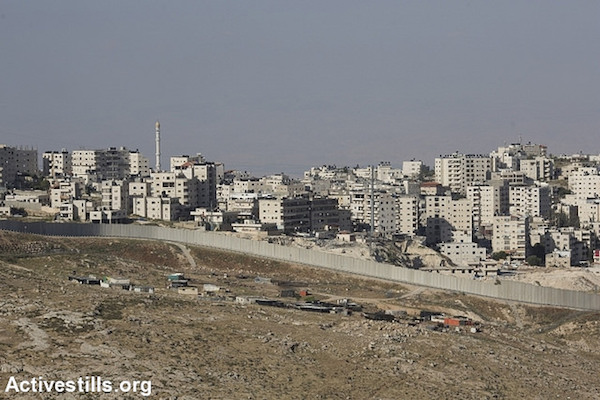End the occupation, and extend full civil rights to Palestinian residents of East Jerusalem. It’s that simple.

Reports of violent clashes in Jerusalem are leading the Israeli news cycle these days, and receiving quite a bit of international coverage as well. Mako, a popular Israeli news site, refers to the actions of Palestinian teens confronting armed security forces wearing protective riot gear as “rock and molotov cocktail terrorism.” The narrative set by Netanyahu’s government, whereby any type of Palestinian protest or violence is labeled terrorism, has seeped into the mainstream media.
Last week a 64-year-old Israeli man named Alexander Levlovich died in Jerusalem after his car was hit by an object that was probably a rock or a cinder block. Palestinian teens were throwing rocks at cars driving on the road at the time. It’s not terribly uncommon to see clusters of Palestinian kids throwing stones at cars driven by Israelis on East Jerusalem roads. Incidents of shocking violence are tragically common in Jerusalem, and strike Jews and Palestinians alike.
The discourse around these incidents is terribly depressing and demoralizing. In this it is a reflection of the entire discourse about the occupation and the future of Israel and Palestine. Netanyahu’s response to the tragic death of Alexander Levlovich was to exploit it to justify his call for loosening the rules of engagement so that security forces would be permitted to shoot Palestinian protestors, even when they present no physical threat. But this has been a de facto practice on the ground for years now, as illustrated by the dozens of video clips easily found online — of soldiers shooting unarmed Palestinians in the back, or from a roof, in the face, or in the toe (while in custody, blindfolded and with wrists bound). In 99 percent of the cases, the soldiers receive either no punishment at all or a meaningless censure. There are no real consequences for soldiers who beat, shoot or kill unarmed Palestinians in the West Bank.
+972 investigates: License to Kill, the Case Files
The incidents mentioned here are just a few examples of a systemic problem for which there is only one resolution: end the military occupation. After nearly 50 years, we should be well past the point of claiming the Israeli army can be an enlightened, all-powerful military ruler of a disenfranchised population that is denied basic civil rights.
But apparently we’re not, which is why people in Israel twist themselves into knots trying to reconcile their need to believe in the essential morality of their army with the reality on the ground. They served in the army themselves and they send their children to serve. Those Israeli kids don’t want to tell their parents they did terrible things in the West Bank and the parents don’t want to believe that their apple-cheeked children did terrible things either. So they don’t talk about it. They pretend it didn’t happen, they convince themselves they didn’t really do it and they call Breaking the Silence a bunch of liars.

Yet there are so many bleak, searing Israeli documentaries about what Israeli soldiers do in the West Bank that are available, subtitled in English, online. And they’ve been broadcast on Israeli mainstream television. People see them, but they don’t absorb the message, because it’s too difficult. [Here are a couple of the most powerful, by the way: Yaniv Berman’s “Alpha Diaries” (with English subtitles) and Tamar Yarom’s “To See if I’m Smiling” (no subtitles).] Despite all the evidence, smart people indulge in stupid arguments to justify the unjustifiable, the destructive and the unsustainable.It doesn’t help that news reports about “violent riots” are actually verbatim transcriptions of army spokesperson statements because not one single Israeli reporter was present at that West Bank demonstration.
And that is also why the spectacle of Palestinian kids throwing rocks at cars in East Jerusalem is more upsetting to the average Israeli than reports about Israeli soldiers shooting or assaulting unarmed Palestinians in the West Bank. Because Jerusalem is “here” and the West Bank is “there.” The West Bank is where crazy settlers and religious people live and it’s that place on the other side of the wall where the Palestinians that hardly anyone ever sees in real life live.
The vast majority of Israelis would never enter East Jerusalem neighborhoods like Silwan, Jabal Mukaber or Sur Bahir — because they are afraid of Arabs. (If you want to experience Mission Impossible, just try to convince a Jewish taxi driver in West Jerusalem to take you to Jabal Mukaber. It’s infinitely easier for an African American man to hail a cab on the Upper East Side of Manhattan). But while Israeli Jews might never visit East Jerusalem (unless it’s to eat knafe in the Old City or pray at the Western Wall), they hear the word “Jerusalem” and they think “our united capital city.” And the idea that there are parts of their city that might be dangerous due to the type of political violence they associate with the West Bank makes them feel vulnerable. Don’t forget, the proposal to divide Jerusalem is still anathema to most Israelis. It’s difficult for them to reconcile their fear and avoidance of the Palestinian East Jerusalem neighborhoods with their hardwired belief that the city should never be divided.

Kids who throw stones at cars should be arrested by civilian police and questioned at the police station in the presence of a guardian and an attorney. They should not be snatched by heavily armed riot police, tossed into military vehicles, driven to the police station at the Russian Compound, questioned with physical and verbal violence without the presence of a parent or a lawyer, and left in a filthy, freezing cell overnight without a blanket or proper food. But that is what happens to Palestinian kids as young as 13 years old in East Jerusalem. And when they throw stones at cars everyone frames this as a political act, branding them as either anti-occupation protestors or as terrorists. As stateless Palestinian residents of East Jerusalem they are not entitled to the same rights and due process as Jewish citizens. Do you think a 13-year-old Jewish boy who threw a rock at a Palestinian car would be snatched by riot police and violently interrogated by police without the presence of a parent and a lawyer? No way.
So, I have three final points to make. 1) If Palestinians in East Jerusalem had the same civil rights as Jews, we wouldn’t have any kids throwing stones at cars ostensibly as political protest; 2) If Palestinians in East Jerusalem had full civil rights, kids who did throw stones would be characterized by the media as juvenile delinquents and tried in civil court after being questioned by police in the presence of a guardian and a lawyer; 3) While these flareups of violence in East Jerusalem generate a lot of headlines in Israel and abroad (and lord please spare me the pundits who start talking about a third intifada because there isn’t going to be one; we are well past the age of intifadas) very few Palestinians are taking part in the protests. As journalist Roy Sharon notes in a Facebook status, Jabal Mukaber alone is home to 30,000 Palestinian residents, but only about 200 are participating in the ongoing clashes with police.
Basically, people just want to live their lives. If they explode in protest, it’s usually because they are denied this basic right due to circumstances beyond their control. Like the occupation.



